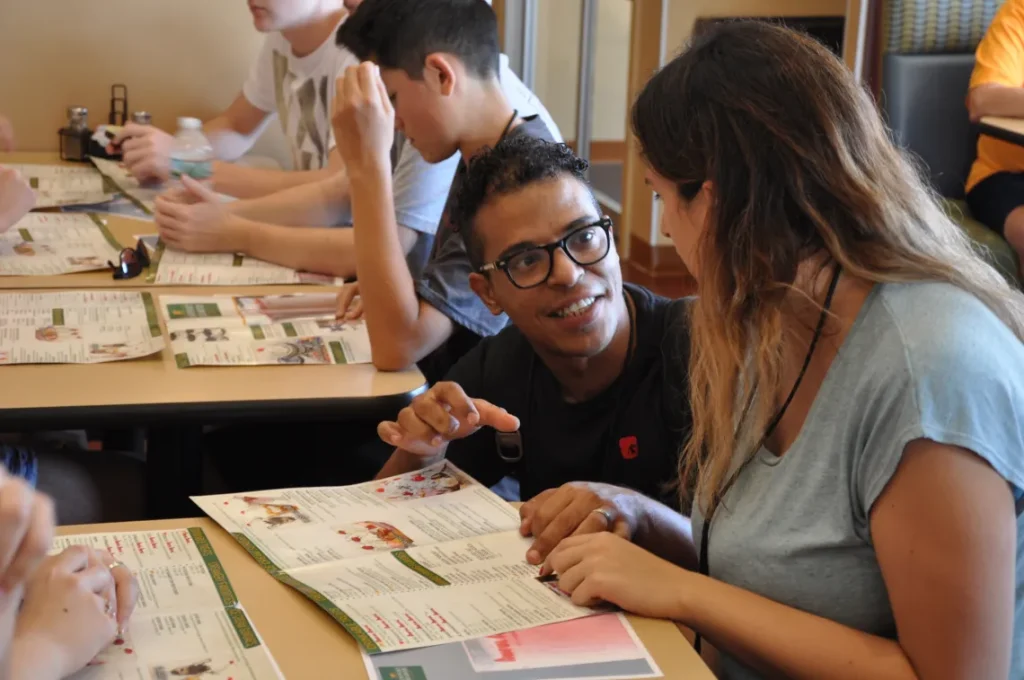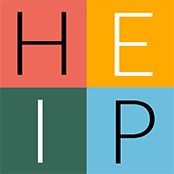- Discount up to 50% for first purchase. Free trial 7 days!
Our Philosophy
Our Philosophy
HEIP follows the Interactionist/Developmental Socio-Cultural Theory (Jean Piaget and Lev Vygotsky), representing a school of thought validating that learning and language learning are acquired through interaction, experiences, and exposure to things that can be observed. Encouraging interpersonal interaction between students, their families, and academic institutions and community organizations gives participants opportunities to build confidence, learn to navigate American culture more effectively, and close the social and psychological distance between themselves and native citizens. HEIP strives to create a classroom environment in which the students’ funds of knowledge, talents, and skills can be expressed free from fear of failure. Our approach supports the development of critical language skills that participants must master to become proficient or accomplished in the learner’s environment.
HEIP interactionist framework uses methods such as the Language Experience Approach (LEA) as the literacy development method. We encourage students to develop language skills engaged in integrated social American contexts. The rationale behind LEA supports students’ experiences of experiencing American cultural, academic, and economic sites. Their participation in things like daily routine, such as shopping, taking a cab, ordering meals, renting a book from a library, having conversations with native English speakers, and studying with teachers and professors from high schools and colleges here in the United States are all unique chances for language function to develop in an integrated social context. This model is effective for beginners, and can also extend to advanced students.
Blended Learning Environment
Students at HEIP experience a meaningful quality language immersion in Rhode Island. Immersive in real context, students enhance their motivation to learn a foreign language while we incorporate their personal goals, interests, emotional state, and physical needs in our curriculum. On the affective level, we promote activities to build self-confidence. We believe that when English language learners are respected and seen as fully capable of accomplishing their goals they increase motivation. Our learning experiences include constant stimulation of all four domains: writing, reading, listening, and speaking.
Teachers and students also use Google Classroom which is culturally and linguistically responsive as a resource because students at HEIP use electronic devices. The language learning processes take place in a native speaking environment. It creates a safe and effective atmosphere through the language immersion that happens throughout the field trips, workshops, campus tour, English classes and longer trips to Washington DC, Boston, and New York.
The Language Experience Approach fits perfectly with young and older learners. Utilizing this approach along with daily storytelling and civic engagement activities, increases students’ reading, writing, listening and speaking skills through social interaction with native English speakers.
Our Language Experience method encourages group reading of daily personal journals by using the level of language and words of the learner for the composition of reading texts. They can then use this method for reading and writing practice. Participants read and experience an historical fiction book sited in Providence, Rhode Island. They have the opportunity to read authentic materials and primary resources as well as learn about their classmates’ experiences through the sharing of their daily journals.
The writing component we use – a daily journal – integrates the view of writing as a fluid process. Through pre-writing, drafting, revising, editing and publishing, rather than a final product isolated in the integrated approach, writing becomes a process which correlates other domains as well. The Language Learning Experience is valuable for one to develop self-confidence through validation of each student`s creative process within their vocabulary, communication and writing needs.
Student engagement with academic institutions and community organizations offers content for activities related to the productive domain. These organizations support HEIP participants in their language development and social interaction. The students discuss field trips content in small groups which provide opportunity for further written and oral interaction.
When students become more familiar with their classmates’ stories they will be more receptive to taking the risk of sharing their own and thus produce meaningful work. This is one of the most important factors in second language acquisition. During the final stages of such comprehensive skills, students can listen to the reading of other students’ papers which will allow them to give both oral and written responses to their interpretation and feedback. This will enhance the rewriting process for the final product.
Profiles
Students
HEIP participants are willing to expose themselves to new experiences and environments that offer opportunities to increase their language proficiency. They view every interaction as a chance to practice and focus on meaning and content. They actively work to develop individual strategies to practice listening, speaking, reading, and writing while experiencing American Culture. HEIP recognizes participants as effective language learners who are also effective culture learners because they recognize the interconnected relationship between language and culture.
EFL Instructors
HEIP teachers are cognizant of language approach, curriculum structure, authentic learning materials, and student participation to maximize student motivation and learning. Integrated activities involving both aspects of comprehension and production are utilized to promote the students’ overall acquisition and development of language. Our planning process for EFL instruction is aimed at accomplishing students` goals and lesson delivery is conducted in the context of the students’ goal structure. The requirements of each activity depend mainly on the proficiency level it is intended to address. Instructors select activities that are adaptable to diverse situations, considering the sociocultural context, age, needs, goals and aspirations of the participants.

Our Founder & Program Director
Central to his beliefs about education is the idea that all students have the innate power to improve their aptitude and potential by increasing confidence in their skills, developing their natural talents and exploring and defining their identity in a social context. His teaching and management practices are based on a student-centered approach where they are given the chance to maintain a sense of personal identity and communicate their needs to a responsive network of educators, administrators, faculty, academic institutions, and community organizations.
Partnerships
Are you a teacher, school official, or professional individual looking to either partner with us or become a representative? We would love to discuss further the possibilities of partnering with you and your students. To get started, look into our programs or contact us via our online form.


Quick Links

Quick Links
Newsletter
Sign up our newsletter to get update information, news and free insight.
Copyright© 2023 Azzy Tech, All rights reserved.

